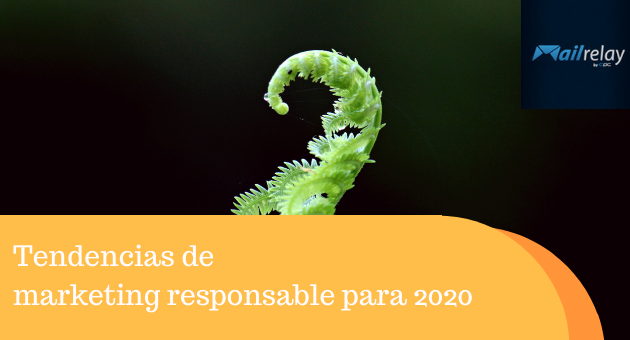
Socially responsible marketing has been a trend, and so we hope it will be one of the trends we will see over the next year.
The reason is obvious; customers demand that their favorite brands engage in some way with social causes that are important to them.
When we talk about socially responsible communication or marketing, some people shake their heads and say it is rubbish, that the most important thing for a company is to make money.
However, that is no longer the case; if you don’t show that your company is socially responsible, many customers will start migrating to other brands.
For this reason, we will share more information on this topic in this article, as we believe you should know what to expect in 2020.
- 1 · Are you ready to work with socially responsible marketing?
- 2 · Socially responsible marketing actions that we will see in 2020
- 2.1 ► More ethical and conscious content
- 2.2 ► Socially responsible marketing through storytelling
- 2.3 ► Extended application of the concept of “action”
- 2.4 ► Solidarity actions with one click
- 2.5 ► Traditional marketing actions focused on solidarity.
- 2.6 ► Product presentation through its social impact
- 2.7 ► Good practices for caring for the environment
- 3 · The future of socially responsible marketing
If we stop to analyze what is happening on the communication channels in these last months of the year, we can already predict what will happen from now on.
We can say with certainty that people are more aware and positively valuing the brands that manage their business relationships responsibly. The truth is those profit-only business strategies are no longer a viable option.
► Society and marketing go hand in hand.
Looking at the lifestyle trends of most people, we can see how society and marketing is changing together, because customers are looking for “greener” products or services.
Consumers today are more interested in everything that reinforces their values of solidarity, ecology, social responsibility, waste reduction, sustainability, time optimization…
This is why more and more brands are committed to a sustainability philosophy and working with socially responsible marketing actions. I could give you many examples, but you have certainly noticed that the number of environmentally friendly advertisements is increasing every day.
If this is what is happening in 2019 in social marketing, it is only logical that next year, these trends will follow the same path, right?

· Socially responsible marketing actions that we will see in 2020
Clearly, there is still a long way to go in terms of socially responsible marketing.
Even so, major steps are already being taken in this direction, and more and more initiatives are emerging by large and small businesses to support corporate social responsibility.
Based on what has happened so far and the public reception of these initiatives, there are specific trends that we can already anticipate for 2020.
Continue reading….
► More ethical and conscious content
Content has long been claimed to be the cornerstone of any marketing strategy, and that is correct. However, many companies have lost their focus in that sense, camouflaging content to sell at any cost, trying to maximize profits without thinking about anything else.
Users are no longer so easily fooled and demand ethical and morally acceptable content. Content that really contributes to something, not just for each person, but for all of us as a society.
In this sense, more and more content marketing initiatives are emerging in all their forms.
Also, the impact of negative actions became immediate; If you do something wrong today, within seconds this information will be shared on social media, and you will be summarily judged by everyone.
► Socially responsible marketing through storytelling
When we are talking about trends for 2020, we can’t help but mention storytelling or narrative as a communication strategy.
Storytelling is the art of telling stories to foster empathy between users and the brands they love.
An art that offers many advantages to those who bet on it; from exploring SEO ranking through text optimization to the opportunity to include business messages that are best accepted when surrounded by a story.
This strategy is related to responsible marketing and trends for the coming year because when we tell real stories, we build closer ties with our customers.
Through storytelling, we can explain more complex concepts and actions that could a priori arouse less interest.
Precisely, what is sought with this type of marketing is to have a positive impact on society and to use the power of communication responsibly. I can assure you that storytelling is a useful technique for that purpose. If you write engaging texts, you would be able to captivate your readers’ attention for several minutes, improving your brand image and SEO strategy.
We can also apply this strategy through multiple channels at the same time, or even working with partner companies, to create a successful chain that will benefit several brands.
This is why I am convinced that this strategy will be very present in many campaigns next year.
► Extended application of the concept of “action”
Another change that more traditional marketing is going through to become responsible marketing is the introduction of new terms. Or rather, new meanings for words that are not so new.
For example, until recently, the words “donation” and “help” when in a marketing message were directly related to an NGO, right? However, we see how this is changing and now these words are being used in a broader sense, promoting standard support in many areas.
For example, we often see the concept of digital donations on image platforms, educational material, audios, music, GIFs, among many others.
These services offer us, in addition to typical Free or Premium plans, a third option; we can download a file in exchange for a voluntary donation.
A step further, and as an excellent example of this trend in socially responsible marketing, we have platforms like Patreon, which was created precisely so that users can support their favorite content creators.

In addition to donations, companies can evolve to more sustainable business models, such as the subscription model.
► Solidarity actions with one click
Marketing awareness, not only found in the case of specific brands, but also in the online communication channels themselves, which impact and foster behavioral changes by applying different options.
We could talk about Facebook, as they set aside the typical birthday reminder videos and started to work with strategies much more focused on solidarity.
Now Facebook gives us the option to ask our followers, as a birthday gift, a donation to the NGO we want to support.
To do that, Facebook has developed an all-in-one app where you can set your goal, collect donations, and send them to the NGO of your choice.
The same goes for “Movember campaigns,” which is already part of many channel marketing calendars; many online platforms make it easy to collect donations and plan events in late November.
► Traditional marketing actions focused on solidarity.
While the actions we will see at this moment are already customary, rather than a new marketing trend, we should not ignore their value.
The interesting thing is to highlight some examples: it is a trend that has evolved since, for many years, it is common to find brands that are working together to create social actions.
For example: Ausonia is one of the big brands committed to this type of campaign. For each product they sell, they subsidize one minute of breast cancer research.
They have been doing that for years with the help of AECC.
If we look at more current examples, we will see that many brands are changing that strategy to one that involves “likes”, “comments”, “reviews”, “clicks” etc.
For example: In Spain, Central Lechera Asturiana launched a campaign 4 years ago, if they could reach 100000 views, they would donate some money to an NGO.

Companies that are aware of society’s needs today are already changing the way they sell products and services.
Many marketers discovered that the fact that a product is greener is more important than the fact that it is cheaper.
Now it’s important to talk about why a product is the best choice for the environment or about social organizations that can benefit from purchasing the product in question.
For example, it doesn’t only matter whether a product is large or small, but also whether the materials used are environmentally friendly, whether this option is better than the competition for polluting less or having a positive social impact.
Think about plastic bags; Did you know that more and more people prefer to pay more to buy bags in other environmentally friendly materials? The focus is not on money, but on what will be best for all of us and our planet.
This doesn’t mean that users no longer want to know the basics of a product, but it is no longer the only thing we care about as buyers.
Also, as consumers, we are more aware of our power in society because with small, responsible gestures, we can make a significant global impact.
► Good practices for caring for the environment
The last of the social marketing actions I want to comment on as a trend for 2020 is any business practice focused on protecting the environment and the planet’s natural resources.
We can see how more and more companies take great care of how they spread their messages. For example, with less polluting options or systems for sharing accurate information about your products or services.
As customers, we want to have precise information about the type of product or service we are buying, whether it is safe for children, pets, and other aspects that were previously not considered vital.
Legislation has already set limits on alcohol and tobacco for a long time, but there are many other products to watch out for — for example, very sugary or harmful food products.
Brands, aware of user concerns, are increasingly careful about their marketing campaigns and take into account the environment, the audience, and the channels.
Of course, not all industries are equally aware of this type of marketing, and for some sectors, there is still a long way to go.
However, we can talk about a general tendency towards more awareness, both by users and companies.
Users not only want to spend less, but they also want to buy consciously. They want to buy what is best for themselves but also for the planet.
In this article, I shared 7 trends that we can expect to see in 2020, according to what we can detect in recent months.
I would like to know your opinion about that, what do you think of these marketing actions? Do you think they are a reality or that there is still a lot to be done?


